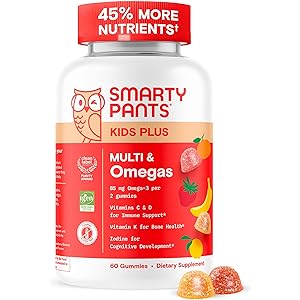Physician's Choice Probiotics 60 Billion CFU - 10 Strains + Organic Prebiotics - Immune, Digestive & Gut Health - Supports Occasional Constipation, Diarrhea, Gas & Bloating - for Women & Men - 30ct
$23.97 (as of October 25, 2025 06:13 GMT +00:00 - More infoProduct prices and availability are accurate as of the date/time indicated and are subject to change. Any price and availability information displayed on [relevant Amazon Site(s), as applicable] at the time of purchase will apply to the purchase of this product.)Iron Deficiency
Iron deficiency is one of the most prevalent nutrient deficiencies worldwide, affecting millions of people, particularly women and children. This condition arises when the body lacks sufficient iron to produce hemoglobin, the protein in red blood cells responsible for transporting oxygen. Symptoms often include fatigue, weakness, and pale skin, which can significantly impact daily life and overall health. Iron-rich foods such as red meat, beans, and fortified cereals are essential for preventing this deficiency, while supplements may be necessary for those with higher needs or absorption issues.
Vitamin D Deficiency
Vitamin D deficiency is another common issue, particularly in regions with limited sunlight exposure. This vitamin plays a crucial role in bone health by aiding calcium absorption and supporting immune function. A lack of vitamin D can lead to bone pain, muscle weakness, and increased risk of fractures. People who are at risk include those with darker skin, older adults, and individuals who spend most of their time indoors. Sources of vitamin D include fatty fish, fortified dairy products, and sunlight exposure, making it essential to monitor levels, especially in the winter months.
Vitamin B12 Deficiency
Vitamin B12 deficiency is particularly common among vegetarians and vegans, as this essential nutrient is primarily found in animal products. B12 is vital for nerve function, DNA synthesis, and the production of red blood cells. Symptoms of deficiency can include fatigue, weakness, constipation, and neurological issues such as numbness and tingling. To prevent this deficiency, individuals may need to consume fortified foods or take supplements, especially if they follow a plant-based diet.
Folate Deficiency
Folate, or vitamin B9, is crucial for DNA synthesis and repair, making it especially important during periods of rapid growth, such as pregnancy. Folate deficiency can lead to anemia and, in pregnant women, increase the risk of neural tube defects in the developing fetus. Common sources of folate include leafy greens, legumes, and fortified grains. Ensuring adequate intake of this nutrient is vital for reproductive health and overall well-being.
Magnesium Deficiency
Magnesium deficiency is often overlooked but can have significant health implications. This mineral is involved in over 300 biochemical reactions in the body, including energy production, muscle function, and blood pressure regulation. Symptoms of magnesium deficiency may include muscle cramps, mental disorders, and irregular heartbeat. Foods rich in magnesium include nuts, seeds, whole grains, and leafy green vegetables. Ensuring a balanced diet can help maintain adequate magnesium levels and support overall health.
Zinc Deficiency
Zinc deficiency is a common issue, particularly in developing countries. This essential mineral is crucial for immune function, wound healing, and DNA synthesis. Symptoms of zinc deficiency can include hair loss, diarrhea, and delayed wound healing. Populations at risk include pregnant women, infants, and individuals with gastrointestinal diseases. Good dietary sources of zinc include meat, shellfish, legumes, seeds, and nuts, making it essential to include these foods in a balanced diet to prevent deficiency.
Calcium Deficiency
Calcium is vital for maintaining strong bones and teeth, as well as for muscle function and nerve signaling. Calcium deficiency can lead to osteoporosis, a condition characterized by weak and brittle bones. Symptoms may not be immediately apparent, but over time, inadequate calcium intake can result in fractures and other complications. Dairy products, leafy greens, and fortified foods are excellent sources of calcium, and ensuring sufficient intake is crucial, especially for women and older adults.
Vitamin A Deficiency
Vitamin A deficiency is a significant public health issue in many parts of the world, particularly in developing countries. This vitamin is essential for vision, immune function, and skin health. A lack of vitamin A can lead to night blindness and increase the risk of infections. Foods rich in vitamin A include liver, fish, dairy products, and colorful fruits and vegetables like carrots and sweet potatoes. Ensuring adequate intake of this nutrient is vital for maintaining overall health and preventing deficiency-related complications.
Potassium Deficiency
Potassium is an essential mineral that plays a critical role in maintaining fluid balance, nerve function, and muscle contractions. Potassium deficiency, though less common, can occur due to excessive sweating, vomiting, or diarrhea. Symptoms may include muscle weakness, cramps, and irregular heartbeats. Foods rich in potassium include bananas, oranges, potatoes, and spinach. Maintaining a balanced diet with adequate potassium intake is crucial for overall health and well-being.
Vitamin C Deficiency
Vitamin C deficiency, also known as scurvy, is rare in developed countries but can still occur, particularly among individuals with limited access to fresh fruits and vegetables. This vitamin is essential for collagen synthesis, immune function, and antioxidant protection. Symptoms of deficiency can include fatigue, swollen gums, and joint pain. To prevent vitamin C deficiency, it’s important to consume a variety of fruits and vegetables, particularly citrus fruits, strawberries, and bell peppers, which are all rich in this essential nutrient.


